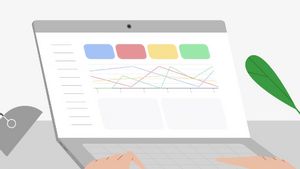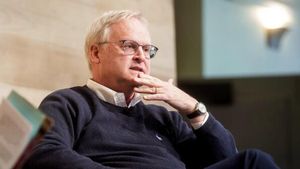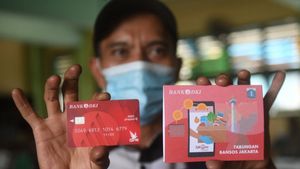JAKARTA - Facebook founder Mark Zuckerberg is reportedly fond of meeting while walking, and the same thing was done by Apple founder Steve Jobs - and scientists have proven they are right.
With just 20 minutes running, the brain can prepare to receive and store new information, according to neuroscience research.
This positive effect can be seen in the area of the brain involved in decision making, stress management, and behavior planning.
Various forms of physical exercise also have their own benefits for brain health, but this study shows that with just a little walking it can already improve brain thinking power - and run for 20 minutes much better than not exercising at all.
Images of differences in the brain while sitting still for 20 minutes compared to walking for 20 minutes in the spotlight in online media.
A social media user, Tim Carden, shared information about the benefits of running this, noting that philosophers such as RAISE, Virginia Woolf, and Nikola Tesla also believe in the benefits of running training.
Physical exercise can increase the amount of gray matter in the brain, which contributes to balance and coordination. These changes can have long-term health impacts, such as reducing the risk of falling.
"Throughout history, the biggest thinkers are walking lovers," said Carden, who is one of the founders of Thoughttleadr. "Technical entrepreneurs including Steve Jobs and Mark Zuckerberg are known to support meetings while walking. "Going to help overcome mental blocks, raise divergent thinking, and connect ideas."
He also noted thatRATEs, the father of modern medicine, once stated 'going is the best human medicine.'
This movement is not only beneficial for brain health, but also strengthens the heart, lungs, bones, and helps digestion and regulate blood sugar.
Carden shared brain scans from a study in 2009 conducted by researchers at the University of Illinois.
Participants who walked for 20 minutes on the treadmill before a reading test showed significant results better than people sitting still for 20 minutes.
Measurements of brain activity with electroencephalography (EEG) provide clues about what happened.
These EEG measurements show that participant brain activity is significantly higher after running, and some effects of brain enhancement last nearly 30 minutes after they finish exercising. Scientists also saw a concrete positive effect of this brain increase.
SEE ALSO:
In a study from scientists at Stanford University, volunteers showed better performance in creative thinking tests if they did as they walked than sitting.
More than 80 percent of participants show more creativity in their answers as they sit. Running can also provide benefits in social interactions.
Both for business and pleasure matters, Mark Zuckerberg's walking habits can provide huge benefits: larger volume of gray matter, and higher brain activity in areas related to motor control and cognition.
Carden went on to explain why he believed that it was superior to other types of exercises, noting that it was easier for joints, didn't require gym equipment, and could be done anytime and anywhere.
Research published in 2023 found that a quick walk for just 11 minutes a day could reduce the chance of early death by a quarter.
Data analysis involved more than 30 million people finding that 75 minutes per week of moderate-intensity activity - such as cycling, climbing, or dancing - reduced the risk of early death by 23 percent.
In particular, this reduces the risk of developing cardiovascular disease - which can cause heart attacks and strokes - by 17 percent and cancer by 7 percent.
Social media users also say that 'running after eating is a double advantage,' which is in line with findings from a study in 2022 conducted by researchers from the University of Limerick in Ireland.
Running for a while after eating can reduce blood sugar levels and lower the risk of type 2 diabetes, the team said.
Starting from 60 to 90 minutes after eating is an optimal time because at that time blood sugar levels tend to peak and allow muscles to absorb fuel from food.
People have to walk for 15 minutes but even 'run mini' for two to five minutes has already benefited.
The English, Chinese, Japanese, Arabic, and French versions are automatically generated by the AI. So there may still be inaccuracies in translating, please always see Indonesian as our main language. (system supported by DigitalSiber.id)


















